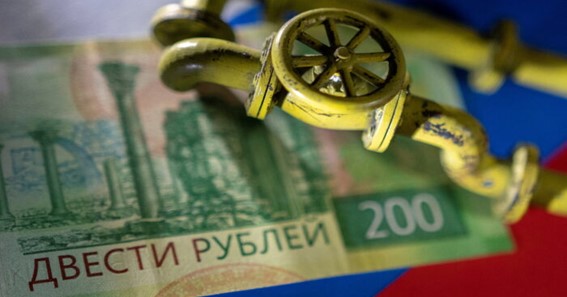MOSCOW: Russian President Vladimir Putin said on Wednesday that Russia will only accept gas supplies paid in rubbles to “unfriendly countries”, including all EU member states after Moscow was hit by unprecedented sanctions over Ukraine.
Following his announcement, the rubble – which has fallen sharply since the start of the Ukrainian conflict – strengthened against the dollar and the euro, as gas prices rose.
“I have decided to take a number of measures to equate our payments for gas supplies to unfriendly countries to the Russian rubble,” Putin said at a government meeting. However, he added that Russia will continue to supply the gas specified in its contract.
It’s breaking news that Putin ordered the central bank to implement the new payment system within a week, saying it must be “transparent” and would involve buying rubbles in Russia’s domestic market. Late Wednesday, the Russian space agency Roscommon announced that it would also insist that its international partners be paid in rubbles.
We will also complete all foreign agreements in rubbles, Roscommon chief Dmitry Rogozin was quoted as saying by the official TASS news agency. There is no point in sending our goods to the EU and the United States and buying dollars, euros, and other currencies, Putin said.
Ukraine has quickly condemned Russia’s economic war against the EU and its attempts to “strengthen the rubble.”
“But the West may impose an oil embargo on Russia, causing the Russian economy to plummet,” Andrey Yermak, adviser to the Ukrainian president, said on Telegram. This is a very important economic battle that the West must win together, he added.
Severe sanctions
German Economy Minister Robert Habeck, who imported 55 percent of its natural gas from Russia before the conflict, said Putin’s demands violated the contract, and Berlin will discuss “how we will respond” with European partners.
Austrian energy company OMV said on Wednesday it would continue to pay for Russian gas in Euros despite the announcement. “There is no other contract basis. Otherwise, I would not be able to do it,” OMV manager Alfred Stern told Austrian television. Since Moscow sent troops into Ukraine, Western countries have imposed severe sanctions on Moscow.
The West froze some $300 billion of Russia’s foreign reserves abroad, a move Foreign Minister Sergey Lavrov called “theft” on Wednesday. But despite the U.S. ban on imports of Russian oil and gas, the European Union — which gets about 40 percent of its gas supplies from Russia in 2021 — has kept supplies from Moscow.
However, Brussels has set a target of cutting Russian gas imports by two-thirds by the end of this year and is considering an oil embargo. Ipek Ozkardeskaya, the senior analyst at Swiss quote, told AFP: “Russia is now trying to put pressure on the West with counter-sanctions – and reduce its reliance on foreign exchange.”
Historic decision
Russia has been world news pushing to “de-dollarize” its economy for years since it imposed Western sanctions in 2014 over its annexation of Crimea from Ukraine. In March 2019, Russian state energy giant Gazprom announced its first sale of natural gas in rubbles to an unnamed Western European company. Deputy Prime Minister Alexander Novak said on Wednesday that switching to transactions in the national currency would “improve reliability”.
He warned that a total embargo on Russian oil and gas would lead to a “collapse” and “unpredictable” price spikes in global energy markets.
Subvert the opponent
However, Timothy Ash, an analyst at Blue Bay Asset Management, said it was “hard to see Putin’s move as a rubble benefit”. Ashe said Putin was essentially trying to force Western countries to trade with Russia’s central bank, which they had approved. This will only accelerate Russia’s energy diversification, he added.
Russia declares “friendly” figures for more than 70 percent of Russia’s energy exports in terms of revenue, according to the Locko Invest investment group. The group also stressed the danger of Gazprom leaving foreign money to pay off its debts in the future. But Andrew Weiss of the Carnegie Endowment said: “Putin knows exactly how to build and use leverage”.
In such cases, Putin often uses expansion to thwart his opponents’ best plans. There is no doubt that this has changed, Weiss said on Twitter.







